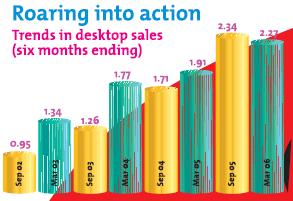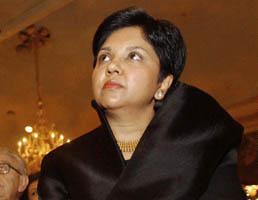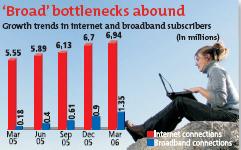For Complete IIPM Article, Click on IIPM Article
Source : IIPM Editorial, 2006
An IIPM and Management Guru Professor Arindam Chaudhuri's Initiative
If the economy is weakening, why should bonds not rally further? There are several reasons for it: It is far from certain that the US economy will slow down right away. Consumers, whose sentiment has recently weakened considerably, could still continue to live above their means for a while by selling equities or simply borrowing even more, because lending standards are still extremely loose – this certainly among the sub-prime lender desperados. Moreover, wage growth and capital spending has recently seen some upside acceleration, which could, at least partially, off set a slump in the housing sector.
For complete IIPM article click here
Source:- IIPM Editorial
Visit also:- IIPM Publication, Business & Economy & Arindam Chaudhuri Initiative
It is India’s misfortune to be stuck with neighbours who haven’t developed a strong culture of democracy and are also prone to descending into chaos. But we cannot be mute spectators. It would be even worse to gloat at how the neighbours seem to be botching up the task of building a modern nation state. Great nations cannot be built when you are surrounded by violence, unrest and anarchy.
Of course, there is little India can do in the immediate short-term to help stabilize South Asia. Nor can it be seen to be interfering in the ‘internal affairs’ of these nations. But there is a lot it can do through back channel and unobtrusive diplomacy that is mature as well as far-sighted.
For complete IIPM article click here
Source:- IIPM Editorial
Visit also:- IIPM Publication, Business & Economy & Arindam Chaudhuri Initiative
 the Middle East by the US and the UK have their roots deep in the Arabian sand. Ever since Winston Churchill led the conversion of Britain’s navy from coal to oil at the start of the last century, the Western powers have meddled incessantly in the affairs of Middle Eastern countries to keep the oil fl owing, toppling governments and taking sides in wars in the supposed great game of energy resources, which is almost over because the old approaches are obviously failing.
the Middle East by the US and the UK have their roots deep in the Arabian sand. Ever since Winston Churchill led the conversion of Britain’s navy from coal to oil at the start of the last century, the Western powers have meddled incessantly in the affairs of Middle Eastern countries to keep the oil fl owing, toppling governments and taking sides in wars in the supposed great game of energy resources, which is almost over because the old approaches are obviously failing. the company is earning more money on less investment. However, when using RoA as a comparative measure, it is always advisable to compare it against a company’s previous year’s RoA figures or the RoA of a company in the same industry. Sheer size of assets doesn’t guarantee efficiency. For instance, if one company has a net income of Rs.2 million and total assets of Rs.10 million, its RoA is 20%; however, if another company earns the same amount, but has total assets of Rs.20 million, it has an RoA of 10%.
the company is earning more money on less investment. However, when using RoA as a comparative measure, it is always advisable to compare it against a company’s previous year’s RoA figures or the RoA of a company in the same industry. Sheer size of assets doesn’t guarantee efficiency. For instance, if one company has a net income of Rs.2 million and total assets of Rs.10 million, its RoA is 20%; however, if another company earns the same amount, but has total assets of Rs.20 million, it has an RoA of 10%. animated ad! This tells a story of a bird who lays two eggs in her nest. But a tortoise’s egg dropsinto the nest and becomes a part of their family. Soon it is time for the kids to learn to fly; the mother takes the kiddie birds on their first flight. Left alone on the cliff, the baby tortoise chews a big Babool gum and jumps off the cliff. But all’s well, because he blows a balloon out of the gum and uses it as a parachute to get a view of the world from the top!
animated ad! This tells a story of a bird who lays two eggs in her nest. But a tortoise’s egg dropsinto the nest and becomes a part of their family. Soon it is time for the kids to learn to fly; the mother takes the kiddie birds on their first flight. Left alone on the cliff, the baby tortoise chews a big Babool gum and jumps off the cliff. But all’s well, because he blows a balloon out of the gum and uses it as a parachute to get a view of the world from the top! Target, Wal-Mart and, of course, Victoria’s Secrets. (Of these, Victoria’s Secrets has a 30% share in the lingerie market in the US.) As of now, JC Penny already has an innerwear line, Delicates, but that has proved to be a bit of a d a m p squib: Experts feel that the brand has to be sexed up and given a bold new identity. For this, JC Penny is looking at selling Ambrielle through a designated 5,000-plus space in each of its stores (the chain as more than 1,000 stores), and there will be three sub-brands: Smooth Revolution, Mystique and Essentials. Good luck with the inside story!
Target, Wal-Mart and, of course, Victoria’s Secrets. (Of these, Victoria’s Secrets has a 30% share in the lingerie market in the US.) As of now, JC Penny already has an innerwear line, Delicates, but that has proved to be a bit of a d a m p squib: Experts feel that the brand has to be sexed up and given a bold new identity. For this, JC Penny is looking at selling Ambrielle through a designated 5,000-plus space in each of its stores (the chain as more than 1,000 stores), and there will be three sub-brands: Smooth Revolution, Mystique and Essentials. Good luck with the inside story! India, which is not the case right now. According to Bundeep Singh Rangar, Chairman, IndusView Advisors, “Outward FDI from a country is a true indicator of a global investor, which wants to have a worldwide presence. China, which receives the highest inward FDI amongst emerging economies, is also planning to make it big in outward FDI also.” Outward FDI from China increased from a meagre $400 million in 1980 to $38 billion by the end of 2004.
India, which is not the case right now. According to Bundeep Singh Rangar, Chairman, IndusView Advisors, “Outward FDI from a country is a true indicator of a global investor, which wants to have a worldwide presence. China, which receives the highest inward FDI amongst emerging economies, is also planning to make it big in outward FDI also.” Outward FDI from China increased from a meagre $400 million in 1980 to $38 billion by the end of 2004. Arabs are evil (or vice versa). Israel will be unable to avoid territorial withdrawals to the 1967 borders by exercising military might; US will be unable to ensure oil security through continued military occupation in the Middle East; and terrorists will be unable to destroy Israel or foist their fundamentalist ideas by force on moderate societies. In my work throughout the world, as an economist and development practitioner, I find that the vast majority of individuals and political leaders of all religions, races, and creeds are ready to work together to achieve prosperity and well being for their children. The claim by many Israelis that there are “no partners for peace” is absurd. Similarly, the claim that we are headed towards an inevitable clash of civilizations is sheer madness, propounded by people who think the worst of other groups, but don’t really know them personally. What unites us is vastly greater than what divides us.
Arabs are evil (or vice versa). Israel will be unable to avoid territorial withdrawals to the 1967 borders by exercising military might; US will be unable to ensure oil security through continued military occupation in the Middle East; and terrorists will be unable to destroy Israel or foist their fundamentalist ideas by force on moderate societies. In my work throughout the world, as an economist and development practitioner, I find that the vast majority of individuals and political leaders of all religions, races, and creeds are ready to work together to achieve prosperity and well being for their children. The claim by many Israelis that there are “no partners for peace” is absurd. Similarly, the claim that we are headed towards an inevitable clash of civilizations is sheer madness, propounded by people who think the worst of other groups, but don’t really know them personally. What unites us is vastly greater than what divides us. group, Belgacom for $2.55 billion in Proximus. The company found the deal lucrative enough to utilise the sale proceeds in order to lighten its debt burden. The deal will make Belgacom the sole controller of the company’s operations. Earlier this year, Vodafone had also sold part of its besieged Japanese business for $11.36 billion. The company is, however, suppressing demands from its investors to sell-off its stake in Verizon Wireless. The group serves about 186.8 million customers at present.
group, Belgacom for $2.55 billion in Proximus. The company found the deal lucrative enough to utilise the sale proceeds in order to lighten its debt burden. The deal will make Belgacom the sole controller of the company’s operations. Earlier this year, Vodafone had also sold part of its besieged Japanese business for $11.36 billion. The company is, however, suppressing demands from its investors to sell-off its stake in Verizon Wireless. The group serves about 186.8 million customers at present.


It’s official now. The Rajya Sabha has been informed that India’s per capita income stands at Rs 23,222 annually at current prices over the year 2004- 05 (the new revised estimates were released by the Central Statistical Organisation on May 31, 2006).
During 2004-05, Chandigarh has recorded the highest per capita income – at Rs 67,370 per annum. Next up is Pondicherry that has a per capita income of Rs 56,034, while the national capital Delhi is third at Rs. 53,976.
For complete IIPM article click here
Source:- IIPM Editorial
Visit also:- IIPM Publication, Business & Economy & Arindam Chaudhuri Initiative
 Inflation in Poland has remained relatively stable and has declined over the years. Consumer prices as measured by CPI increased by 0.80% as on June-06, taken on a year-on-year basis. The economy also felt the heat of increasing crude oil prices quite severely. While the prices for administered products saw a decline, food and fuel prices witnessed the maximum amount of changes.
Inflation in Poland has remained relatively stable and has declined over the years. Consumer prices as measured by CPI increased by 0.80% as on June-06, taken on a year-on-year basis. The economy also felt the heat of increasing crude oil prices quite severely. While the prices for administered products saw a decline, food and fuel prices witnessed the maximum amount of changes.
 Inflation in Saudi Arabia has been well under control and the consumer price inflation has been negative over the last six years. Inflation, as measured by Consumer Price Index, was 99.6 in 2005, as compared to 98 in 2002. Foodstuff s & beverages were the only prominent items, which saw an increase as the index moved from 98 in 2002 to 106.5 in 2005.
Inflation in Saudi Arabia has been well under control and the consumer price inflation has been negative over the last six years. Inflation, as measured by Consumer Price Index, was 99.6 in 2005, as compared to 98 in 2002. Foodstuff s & beverages were the only prominent items, which saw an increase as the index moved from 98 in 2002 to 106.5 in 2005.

 states Takeo Fukui, global CEO, Honda. While entering the Indian market in 1997 with the Honda City, Honda was well aware of the fact that ‘Honda’, in India was considered a prestigious brand, and the premium segment seemed to fit in perfectly with Honda’s ‘testing waters’ strategy as Honda did not want to enter the volume-driven compact segment. In 2001, the company launched the then relatively unsuccessful Accord. But with appropriate market feedback, the subsequent launch of the updated version changed all that; and Accord became the segment leader. Even in 2003, despite various analysts shouting hoarse against it, Honda decided to redesign the Honda City (its original offering) and succeeded. The Accord experience helped in the smooth sailing for its SUV offering, the Honda CR-V, which instantly obliterated competition like Chevrolet Forester and Suzuki Grand Vitara XL7; India has surely been a pleasant feeding ground. But
states Takeo Fukui, global CEO, Honda. While entering the Indian market in 1997 with the Honda City, Honda was well aware of the fact that ‘Honda’, in India was considered a prestigious brand, and the premium segment seemed to fit in perfectly with Honda’s ‘testing waters’ strategy as Honda did not want to enter the volume-driven compact segment. In 2001, the company launched the then relatively unsuccessful Accord. But with appropriate market feedback, the subsequent launch of the updated version changed all that; and Accord became the segment leader. Even in 2003, despite various analysts shouting hoarse against it, Honda decided to redesign the Honda City (its original offering) and succeeded. The Accord experience helped in the smooth sailing for its SUV offering, the Honda CR-V, which instantly obliterated competition like Chevrolet Forester and Suzuki Grand Vitara XL7; India has surely been a pleasant feeding ground. But